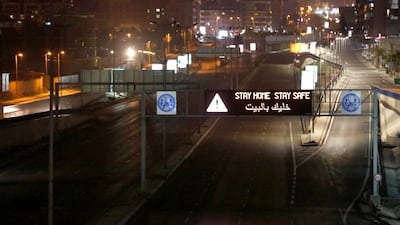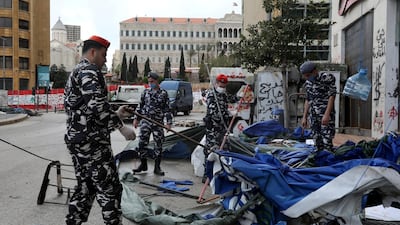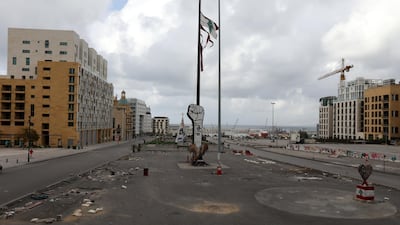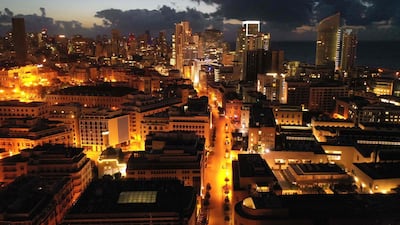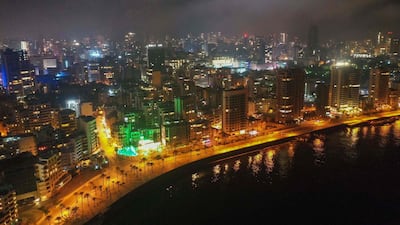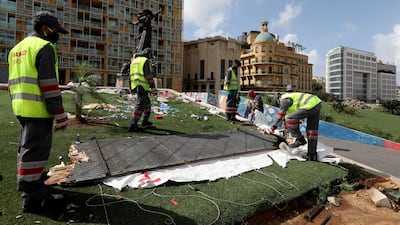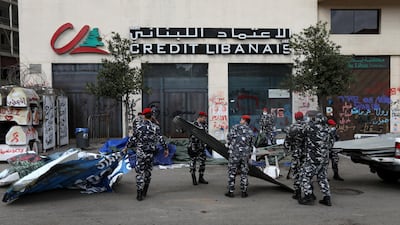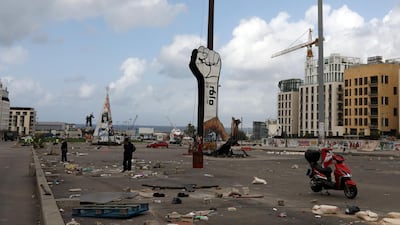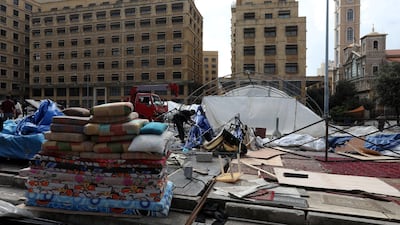Curfews in Lebanon are normally bad news.
They have been brought in several times over the years - during the 15-year civil war and when there have been major security crises since.
More recently, some municipalities used them to limit the movement of Syrian refugees.
But as countries around the world shut down to prevent the spread of the coronavirus, Lebanon has entered a lockdown.
The streets are quiet and I headed out to meet with an army patrol enforcing the nightly curfew.
While the number of deaths in Lebanon - currently 17 as of April 3 - is low compared to other countries, many fear that Lebanon’s health system will be unable to cope if large numbers become infected because of years of underfunding and a major financial crisis that hit the country late last year.
Seconds after I opened my building’s front door to my quiet street, two men hurried past me. We eyed each other. Like me, they probably wondered what others were doing out. I had a permit from the army and my press card, so I felt safe.
My problem was that the army’s public relations department did not know the military patrol hours and could only give me vague indications about where they would be active. I set off on foot to find them.
Except for a few loud voices coming from a second-floor apartment, everything was eerily quiet. I walked past cats playing in the empty streets.
At around 7.39pm, as I reached Charles Malek, one of Beirut’s main arteries, a car screeched past me before abruptly stopping at a police checkpoint. A few seconds later, it drove off.
Two policemen stared at me as I walked up to them. I was the only pedestrian around. “We are just giving them a warning,” one said. “Tomorrow, we’ll start giving fines.”
How much? He did not know. The government has never announced precise amounts and when I asked a police spokesperson, he said a judge would decide after the fine was issued.
A few minutes later, I heard loud voices and banging. A seven-floor residential building was getting ready to salute Lebanon’s medical workers with horns and pots and pans. Women were shouting from their balconies at an Al Arabiya TV crew waiting to film them, asking them for how long they should make noise.
Wearing a mask, a man wearing a jacket that said “State Security” stood nearby. “How many people have died in France?” he asked, immediately after asking me where I was from.
Embarrassed, I realised that I didn’t know. After checking the news on my phone, I told him that the virus had killed 2,606 people in France at the time. He rolled his eyes. “We are safer here,” he said. For once, roles were reversed. Normally, people ask me how to get a visa to Europe.
Security forces did not seem keen to punish people, which would only increase social unrest.
Last week, a taxi driver torched his car and one man tried to self-immolate after they were fined for breaking confinement measures. “I could technically fine people too, but I prefer not to. I look the other way,” said the state security employee.
I arrived at Martyr’s Square just in time to witness the call to prayer at the majestic Al Amine Mosque. The area had been cleared of protesters two days earlier, and nothing was left of their tents. The only remnants of five months of protests were the graffiti on the walls, broken glass windows, a giant clenched fist and a huge phoenix made from tent poles that were broken by thugs last November.
A security guard, who was watching the square’s empty parking lot, pointed at his tiny shelter. “There’s a homeless man in there. He was with protesters. Can you help?” he asked.
I put him in contact with an activist I had interviewed a few hours before. Before I left, he asked me for money to buy food for the man.
At 8.47pm, I walked past two policemen half asleep in their car on Martyr’s Square. Their colleagues, standing a few metres further along the square, were more keen. “There’s a curfew!” one of them told me, before nodding me on when I said I was a journalist. I made it to the sea front, where a soldier watched me from behind the walls of a military base.
Still no sign of a military patrol. On my right, there was a dark, vacant lot. The silence was unsettling, so I decided to head to another more familiar neighbourhood where an army patrol was supposed to be present.
On my way, I saw more policemen stopping cars. One of them said that starting on Monday, they would be fined 500.000 Lebanese pounds (US$333), a hefty sum in the cash-strapped country.
At 9.42pm, two young men smoking cigarettes at their balcony waved at me and said hello. A few minutes before, I saw the third and last person that night walking in the street. He was wearing what looked like red pyjamas, and studiously avoided eye contact.
“Please, go home!” yelled an employee of Beirut’s municipality as he refuelled his car and pumped sanitising gel on his gloved hands. I obeyed. After two weeks of confinement, walking for over two hours felt long. I never found the army patrol.
After a difficult six months marked by the first default in Lebanon’s history, soaring unemployment, cash shortages, mass protests and a change of government, the small country has surprised itself by its ability to contain Covid-19 up to now.
Though urging caution, Firass al Abiyad, the head of Rafic Hariri hospital, where most patients are treated, tweeted recently that Lebanon is “doing better than expected.”
Boasting about this would be untimely, but Lebanon has achieved what more prosperous nations have not by adopting confinement measures early despite a highly challenging environment. The good news, for once, should be recognised.
